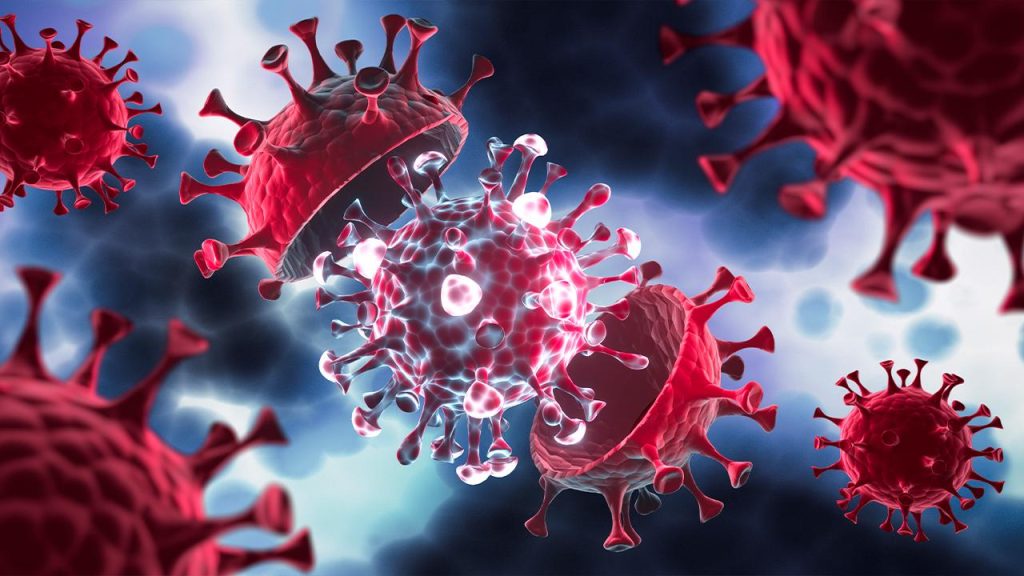The Eris variant is a subtype of the Omicron variant of COVID-19. First detected in South Africa in February 2023, the Eris variant spread rapidly to other parts of the world.
- What are the Symptoms of Eris Variant?
- Is Eris variant present in Turkey?
- Is Eris Variant Contagious?
- Eris Variant Treatment
- How Can We Be Protected From the Eris variant?
- What Is New Information About the Eris Variant?
- What Should We Do to Protect Ourselves From The Eris variant?
- How Does the Eris Variant Differ from Previous Variants of COVID-19?
- What Could Be the Impact of the Eris Variant On The Course of COVID-19?
- Eris Variant and the Immune System
- How Should We Eat to Protect Ourselves From the Eris Variant?
- Foods Effective Against Virus
What are the Symptoms of Eris Variant?

The Eris variant has symptoms similar to those of the Omicron variant. These symptoms include:
- Fever
- Cough
- Fatigue
- Muscles pain
- Headache
- Sore throat
- Loss of taste and smell
- Nasal congestion
- Breathlessness
In some cases, the Eris variant can be more severe and lead to hospitalization.
Is Eris variant present in Turkey?
Minister of Health Fahrettin Koca, in a post on his social media account yesterday evening, announced that the new variant was seen in 9 people in Turkey. Stating that this development is a development that should not be considered a concern, Koca used the following statements:
“The Eris variant is a subtype of the Omicron variant of COVID-19. This variant, first detected in South Africa in February 2023, is thought to be more contagious and more resistant to vaccination. In all 9 cases detected in Turkey, the disease has a mild course. This suggests that the Eris variant may cause a milder picture. However, research on this variant is still ongoing. Therefore, it is important that our citizens continue to protect themselves by taking the necessary precautions against COVID-19.
Is Eris Variant Contagious?

The Eris variant is thought to be as contagious as the Omicron variant. However, more research is needed.
Eris Variant Treatment
No specific treatment has yet been developed for this new variant. Treatments used for other variants of COVID-19 can also be used for this variant.
How Can We Be Protected From the Eris variant?
To protect against this new variant, it is important to get vaccinated against COVID-19, wear a mask and maintain social distancing.
What Is New Information About the Eris Variant?

New information is still being learned about the Eris variant. However, here is what is currently known:
- The Eris variant has several important mutations from the Omicron variant. These mutations suggest that the Eris variant may become more infectious and more vaccine-resistant.
- The impact of the Eris variant on the course of COVID-19 is not yet fully known. However, some studies suggest that this new variant may have a more severe course.
- The Eris variant is considered to be an important variant that could affect the course of the COVID-19 pandemic.
What Should We Do to Protect Ourselves From The Eris variant?
To protect against this new variant, it is important to get vaccinated against COVID-19, wear a mask and maintain social distancing.
How Does the Eris Variant Differ from Previous Variants of COVID-19?
The Eris variant has several important mutations from the Omicron variant. These mutations suggest that the new variant may become more contagious and more vaccine-resistant.
What Could Be the Impact of the Eris Variant On The Course of COVID-19?

The impact of the Eris variant on the course of COVID-19 is not yet fully known. However, some studies suggest that this new variant may have a more severe course.
As a result, the Eris variant is a variant of COVID-19 to be aware of. To protect against the Eris variant, it is important to get vaccinated against COVID-19, wear a mask and maintain social distancing.
Eris Variant and the Immune System
The Eris variant is a subtype of the Omicron variant of COVID-19. First detected in South Africa in February 2023, this variant is thought to be more contagious and more resistant to vaccination.
To protect against virus variants and viruses, it is important to build a strong immune system. The immune system is a system that enables our body to fight against microorganisms. The following recommendations can be made to strengthen the immune system:
- Exercise regularly: Exercise helps stimulate your body’s immune cells. Try to get at least 150 minutes of moderate exercise or 75 minutes of vigorous exercise per week.
- Eat a healthy diet. Eating healthy is one of the best ways to boost your immune system. Eat a diet that includes fruits, vegetables, whole grains, legumes and healthy fats.
- Get enough sleep. Sleep is essential for your body to repair itself and strengthen the immune system. Adults need 7-8 hours of sleep every night.
- Reduce stress. Stress can weaken your immune system. You can do activities such as yoga, meditation, or deep breathing exercises to reduce stress.
- Don’t smoke and limit alcohol consumption. Smoking and drinking alcohol can weaken your immune system.
Recommendations For Protection Against Viruses
It is important to take the following measures to protect against viruses, including the Eris variant:
- Get vaccinated against COVID-19. The COVID-19 vaccine reduces the risk of contracting COVID-19, including the Eris variant, becoming seriously ill and hospitalized.
- Wear a mask. A mask helps prevent the spread of the virus. It is important to wear a mask in crowded and confined spaces.
- Maintain social distance. The virus can spread into the air when an infected person coughs or sneezes. Staying at least 1 meter away from other people reduces the risk of transmission.
- Wash your hands often. Wash your hands with soap and water for at least 20 seconds. Washing your hands reduces the risk of spreading the virus.
- Avoid crowded places. The risk of transmission of the virus is higher in crowded environments. Avoid crowded places unless necessary.
How Should We Eat to Protect Ourselves From the Eris Variant?

The Eris variant is a subtype of the Omicron variant of COVID-19. First detected in South Africa in February 2023, this variant is thought to be more contagious and more resistant to vaccination.
To protect against virus variants, it is important to build a strong immune system. The immune system is a system that enables our body to fight against microorganisms. To strengthen the immune system, it is important to eat a healthy diet.
Here are the basics of a healthy diet:
- Eat plenty of fruit and vegetables. Fruits and vegetables are rich in vitamins, minerals and antioxidants. These nutrients help to strengthen your immune system.
- Eat whole grains. Whole grains are rich in complex carbohydrates, fiber and vitamins. Legumes are rich in protein, fiber and vitamins. These nutrients help to strengthen your immune system.
- Eat lean protein sources. Lean protein sources help maintain muscle tissue and boost your immune system. These nutrients help to strengthen your immune system.
- Eat lean protein sources. Lean protein sources help maintain muscle tissue and boost your immune system.
- Eat healthy fats. Healthy fats help your cells to function properly.
- Drink plenty of water. Water is essential for your body to function properly.
Here are the nutrients you should look out for to strengthen your immune system:
- Vitamin C: Vitamin C is an important nutrient that helps strengthen the immune system. Foods rich in vitamin C include oranges, grapefruit, lemons, kiwi, strawberries, broccoli, peppers, and cabbage.
- Vitamin D: Vitamin D is an important nutrient that helps strengthen the immune system. Foods rich in vitamin D include fish, egg yolks, mushrooms, and dairy products.
- Vitamin A: Vitamin A is an important nutrient that helps strengthen the immune system. Foods rich in vitamin A include carrots, sweet potatoes, pumpkin, spinach, and broccoli.
- Vitamin E: Vitamin E is an important nutrient that helps strengthen the immune system. Foods rich in vitamin E include nuts, almonds, sunflower seeds, olive oil, and avocados.
- Zinc: Zinc is an important mineral that helps strengthen the immune system. Zinc-rich foods include red meat, poultry, seafood, legumes, nuts and seeds.
If your immune system is low, you can do the following:
- Eat more fruits and vegetables.
- Eat whole grains, legumes and lean protein sources.
- Eat healthy fats.
- Drink plenty of water.
- Get enough sleep.
- Reduce stress.
- Don’t smoke and limit alcohol consumption.
Foods Effective Against Virus
Here are some nutrients that have been shown to be effective against viruses:
- Vitamin C: Vitamin C is an important antioxidant that helps strengthen the immune system. Foods rich in vitamin C include oranges, grapefruit, lemons, kiwi, strawberries, broccoli, peppers, and cabbage.
- Vitamin D: Vitamin D is an important vitamin that helps strengthen the immune system. Vitamin D deficiency can increase the risk of getting COVID-19. Foods rich in vitamin D include fish, egg yolks, mushrooms and dairy products.
- Vitamin A: Vitamin A is an important vitamin that helps strengthen the immune system. A vitamin A deficiency can increase the risk of getting COVID-19. Foods rich in vitamin A include carrots, sweet potatoes, pumpkin, spinach and broccoli.
- Vitamin E: Vitamin E is an important antioxidant that helps strengthen the immune system. Foods rich in vitamin E include nuts, almonds, sunflower seeds, olive oil and avocados.
- Zinc: Zinc is an important mineral that helps strengthen the immune system. Zinc deficiency can increase the risk of getting COVID-19. Zinc-rich foods include red meat, poultry, seafood, legumes, nuts and seeds.
Which Vitamins to Consume During the Virus Period?
During the virus period, it is important to consume plenty of the nutrients mentioned above to strengthen your immune system. You should also take care to consume other vitamins and minerals such as iron, magnesium and zinc.

Vimfay International Health Services